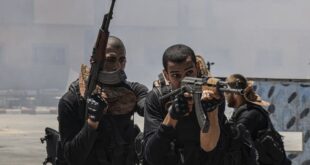RAMALLAH — Fateh yesterday deployed a new security force in Jenin in an apparent response to the unit created by Hamas in the Gaza Strip two weeks ago.
The force of 2,500 men mirrors Hamas’ 3,000-strong force in Gaza and its deployment Saturday afternoon appears to be a signal that Fateh intends to copy any moves on the security front that Hamas makes.
Some Fateh officials say they believe Hamas has begun organising its own forces in the West Bank similar to the one deployed in Gaza. Hamas has not confirmed this. But the head of the new force in Jenin, Ata Abu Rumeileh, denied any connection between the new Fateh force and the Hamas force.
 “This force is directed against nobody, it only aims to protect the Palestinian national project,†Abu Rumeileh told AFP.
The presence of the new Fateh force, on top of the official security branches that the movement already dominates, is set to further ratchet up tensions between Fateh and Hamas. The strains between the two main Palestinian factions have already erupted in deadly violence last month and Hamas officials condemned the move.
“It is unacceptable for any faction to field a militia in support of the security apparatus,†Deputy Prime Minister Nasser Shaer told a news conference in Ramallah. The government says the Hamas force in Gaza will be merged with the Palestinian police in the next couple of days.
But in another sign of increased internal tension, a leading member of Hamas’ military wing, the Izzeddine Al Qassam Brigades, was shot in the chest in a drive-by shooting early Saturday in a neighbourhood of Gaza City, Palestinian security officials and Hamas officials said.
The man, Abdel Hadi Siyam, 35, was taken from the hospital to a Hamas-run clinic for security reasons, according to Hamas officials.
Hamas has not publicly fingered anyone for the shooting, but Hamas officials said Siyam, who is wanted by Israel, was fired at in the same neighbourhood two months ago by Fateh-dominated Palestinian security forces and escaped injury.
Fateh and Hamas are currently in talks to put an end to factional infighting that left 11 dead last month. Palestinian President Mahmoud Abbas is due in Gaza Monday for stepped-up efforts to find agreement, though yesterday presidential adviser Nabil Amr said Abbas would not set out for Gaza as long as the Hamas force was deployed in the Strip.
Meanwhile, talks are set to resume in Ramallah, as Abbas’ deadline to reach agreement in inter-factional talks looms.
Abbas has said if no agreement is reached he will take the so-called Prisoners’ Document to a popular referendum.
The Prisoners’ Document advocates a national unity government and Palestinian state in the Gaza Strip and West Bank, including East Jerusalem, among other things, and was agreed upon by representatives of all factions in Israeli prisons.
According to Bassam Salhi, the representative of the Palestinian People’s Party at the talks, Hamas and Islamic Jihad remain the only factions opposed to the initiative.
“All the Palestinian factions and representatives of civil society have agreed to the prisoners’ initiative, with the exception of Hamas and Islamic Jihad,†Salhi told AFP Saturday.
Thursday, government spokesman Ghazi Hamed told The Jordan Times that Hamas was not opposed to a referendum “in principle†but that it would prefer to allow inter-factional talks time to succeed. Meanwhile, the government has promised to pay the 40,000 lowest paid PA employees their cheques Monday morning.
The payments, promised last week, had been delayed for “procedural reasons,†according to government officials. The remaining 1250,000 PA employees will receive part of their salaries in a second round of payments.
In Nablus and Ramallah, people took to the streets in protest at the non-payment of salaries.
In Nablus, some 2,000 government workers, armed Palestinian police among them, held up photographs of late Palestinian President Yasser Arafat and Abbas, chanting: “We want our wages, not promises.â€
In Ramallah, another 100 protesters, mostly women and children relatives of Palestinian prisoners, shut down the city’s main route by laying across the road and setting tyres on fire.
Early Saturday in the northern Gaza Strip, meanwhile, two sisters aged one and three, were wounded by shrapnel from Israeli shelling the Israeli army said came in response to Palestinian mortar fire.Â
 Eurasia Press & News
Eurasia Press & News
